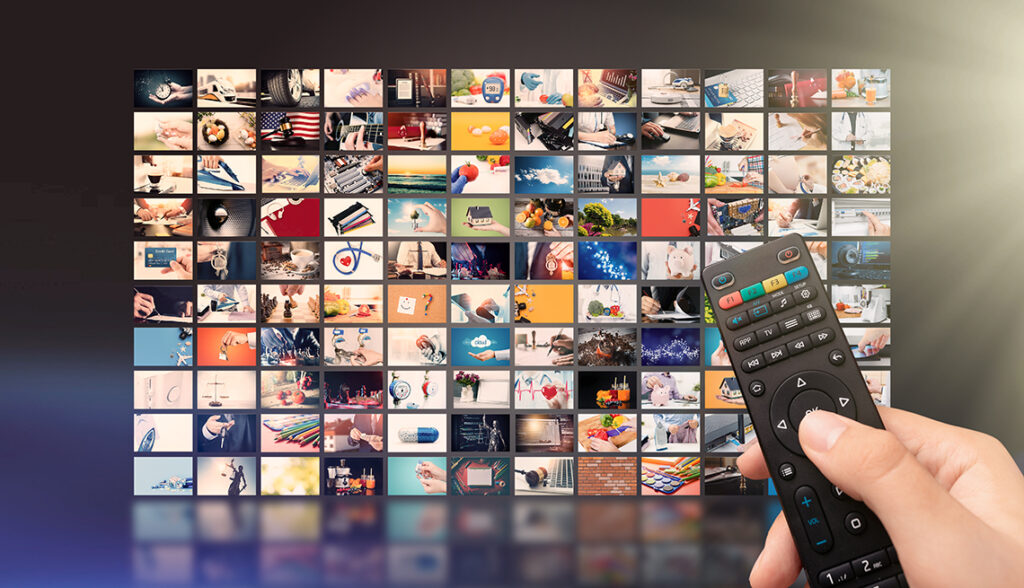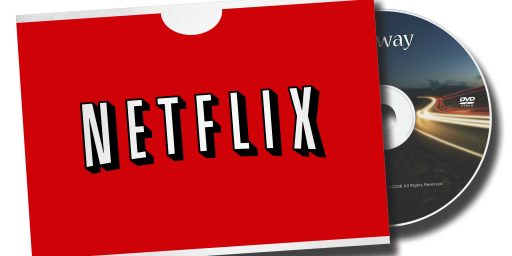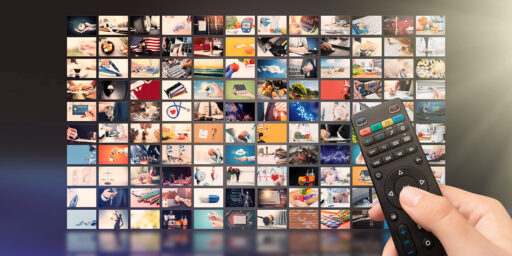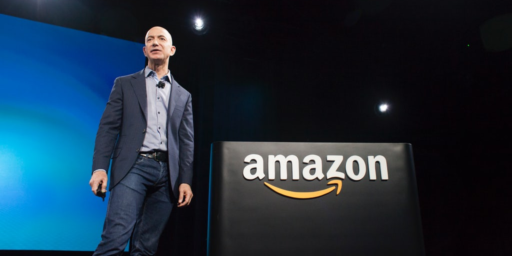Enshittification of Streaming
How something so promising became so frustrating.

We’ve devoted a lot of pixels over the last decade-plus to the slow demise of the cable bundle, the concomitant rise of streaming services, and the frustrations of consumers as the wonders of the latter start to resemble a more frustrating version of the former. The Atlantic‘s Charlie Warzel devotes the first two-thirds of “Streaming Has Reached Its Sad, Predictable Fate” to a rehash of that history before getting to his take:
If what has happened to streaming feels familiar, that’s because it is. Occasionally, as the writer Cory Doctorow has argued, tech platforms offer a service that’s genuinely helpful or unique, and subsidize the cost for users in order to hook them. Once users are dependent, the companies “abuse” them, squeezing out revenue by either jacking up prices or surveilling users and selling the data, which is part of a process he calls “enshittification.” Maybe you’ve noticed that Google Search isn’t as helpful as it once was. But there is another side of enshittification, too. Sometimes, a new service emerges, offering an idealized, likely heavily subsidized version of itself—so good, in fact, that it is adopted quickly and then relentlessly copied by competitors to the point that it becomes economically unsustainable. Think MoviePass.
Streaming appears to be a mix of the two. It is a genuine technological achievement that ushered in an embarrassment of riches. Like MoviePass, the earliest iterations felt almost too good to be true, combining great value with true utility. The model was beloved, but also copied to the point of absurdity. In the long run and in times of nonzero interest rates, it’s entirely possible that the model is unprofitable. It is also a story of scale-chasing that leads to irrational business decisions, lighting piles of cash on fire, and, ultimately, providing users with slowly degrading or bewildering products.
What is left is a cognitive dissonance that comes along with our streaming rituals—the feeling of being presented with infinite choice while also experiencing a vague sense of loss. Perhaps this is because people like myself are unable to understand how good we have it. But there is something about our current streaming paradox that also speaks to the feeling of living a life mediated by Silicon Valley. Perhaps the lesson is simply that infinite choice is glorious in theory, but in practice, it is undesirable and only able to exist undergirded by fractured, bureaucratic, and algorithmic systems. It’s a notion both timeless and distinctly modern: A fundamental experience of being alive on the internet in 2023 is getting everything you asked for and realizing that the end product is not what it seems.
Doctorow’s coinage enshittification, dating back to a January analysis of the decline of TikTok, has really caught on, at least in my social media circles. He describes the cycle this way:
HERE IS HOW platforms die: First, they are good to their users; then they abuse their users to make things better for their business customers; finally, they abuse those business customers to claw back all the value for themselves. Then, they die.
The illustration that the most resonates with me is that of Amazon:
When a platform starts, it needs users, so it makes itself valuable to users. Think of Amazon: For many years, it operated at a loss, using its access to the capital markets to subsidize everything you bought. It sold goods below cost and shipped them below cost. It operated a clean and useful search. If you searched for a product, Amazon tried its damndest to put it at the top of the search results.
This was a hell of a good deal for Amazon’s customers. Lots of us piled in, and lots of brick-and-mortar retailers withered and died, making it hard to go elsewhere. Amazon sold us ebooks and audiobooks that were permanently locked to its platform with DRM, so that every dollar we spent on media was a dollar we’d have to give up if we deleted Amazon and its apps. And Amazon sold us Prime, getting us to pre-pay for a year’s worth of shipping. Prime customers start their shopping on Amazon, and 90 percent of the time, they don’t search anywhere else.
That tempted in lots of business customers—marketplace sellers who turned Amazon into the “everything store” it had promised from the beginning. As these sellers piled in, Amazon shifted to subsidizing suppliers. Kindle and Audible creators got generous packages. Marketplace sellers reached huge audiences and Amazon took low commissions from them.
This strategy meant that it became progressively harder for shoppers to find things anywhere except Amazon, which meant that they only searched on Amazon, which meant that sellers had to sell on Amazon. That’s when Amazon started to harvest the surplus from its business customers and send it to Amazon’s shareholders. Today, Marketplace sellers are handing more than 45 percent of the sale price to Amazon in junk fees. The company’s $31 billion “advertising” program is really a payola scheme that pits sellers against each other, forcing them to bid on the chance to be at the top of your search.
Searching Amazon doesn’t produce a list of the products that most closely match your search, it brings up a list of products whose sellers have paid the most to be at the top of that search. Those fees are built into the cost you pay for the product, and Amazon’s “Most Favored Nation” requirement for sellers means that they can’t sell more cheaply elsewhere, so Amazon has driven prices at every retailer.
Search Amazon for “cat beds” and the entire first screen is ads, including ads for products Amazon cloned from its own sellers, putting them out of business (third parties have to pay 45 percent in junk fees to Amazon, but Amazon doesn’t charge itself these fees). All told, the first five screens of results for “cat bed” are 50 percent ads.
This is enshittification: Surpluses are first directed to users; then, once they’re locked in, surpluses go to suppliers; then once they’re locked in, the surplus is handed to shareholders and the platform becomes a useless pile of shit. From mobile app stores to Steam, from Facebook to Twitter, this is the enshittification lifecycle.
Aside from the flooding of the store with junk products with absurd made-up names, the part that most frustrates me is that the price displayed on the search is either not available or is available on one particular color or size of the product while the one that Amazon knows will fit the customer is wildly more expensive. Amazon hasn’t become shitty enough yet for me to abandon them for a competitor but they’re steadily getting there.
I’m not sure that this model is quite what’s happening with streaming, though.
When Netflix invented it fifteen years ago, it was surely subsiding the product: pretty much every movie or old television show you’d want to see at a remarkably low price. But it didn’t intentionally make the product shittier to please shareholders. Rather, the content providers—movie studios, television networks, and the like—realized Netflix was essentially destroying their business model. Rather than an adjunct to selling DVDs of inventory that was no longer in the theaters or in the current season, customers were substituting Netflix for going to the theaters and watching shows that were currently airing, preferring to either watch movies in the comfort of their own home on their own big screens or binge-watching shows rather than waiting days, weeks, or even months between episodes.
Eventually, the studios and networks pulled back their content from Netflix and started their own services. Netflix responded by becoming a content creator, sending the Golden Age of Television into high gear.
But, it turns out, it’s really expensive to make movies and shows people want to watch and yet customers expected to enjoy an All You Can Eat Buffet of them for the low, low price of $9.99. So, suddenly, the services started putting less content on their platforms—going so far as to take already-produced programming off of them to write them off as business losses—and looking to find other revenue streams like advertisements.
So, yes, the product has become radically shittier and more expensive at the same time. But, unlike Amazon and the social platforms, I don’t think that was the plan so much as fallout from a plan that didn’t come to fruition.





Some of the enshittification might have been built in the platforms, but some of the current problems with streaming depended on the strategies these companies pursued. They banked on producing massive amounts of content. Sometimes, they lucked out, producing mega-hits like Stranger Things and Game of Thrones that attracted people to the platform. Then they provided a bewildering amount of shows that were designed to keep you there, including programming so banal and brainless that their target demographic was people who wanted something on in the background while they were cooking dinner or watching the kids or otherwise not paying attention to what was playing. That was a choice, not an inevitability, that led to lots of crappy programming, a business model based on unsustainable expectations, and the abusive treatment of actors and writers.
By the way, as a particular type of consumer — someone with very broad and passionate desire for good programming, from black-and-white classic movies to obscure foreign films to British detective miniseries to timely documentaries — none of the crap that was at the heart of the streaming companies’ business models had any attraction for me. When Netflix shifted from sending CDs from a vast library of existing content to Netflix streaming its own content, the new platform gave me very little of what I wanted, as that type of consumer. I’m usually looking for something specific I already want to watch, not idly switching on whatever looks interesting on the list of shows that the company is pushing at the moment. I know that probably puts me in the minority of viewers, but speaking for myself, I’m paying more now while feeling like I’m getting less.
The idea of loss leaders have been around forever. It just manifested itself differently in the tech sector. Sure the Amazons and the Netflix’ are charging more because they can. Entirely predictable. And something new will come around. I remember going to the movies in the 60s where we were subjected to “Stop Pay TV” ads denouncing the dangers of cable services that were starting up. We still call those services cable even though they are basically internet service with a streaming bundle. The streaming bundle (DirectTV, YouTubeTV, etc) is about to collapse due to cord cutting and rise of individual streams both free and paid.
Is it better or worse? Depends on your perspective. Those who want live sports are going to pay a lot more (or team owners and players are going to get a pay cut). For a lot of us who don’t want to pay much more than internet costs are going to churn the heck out of the paid streamers or just stick to an ala carte approach.
I think an under-appreciated problem comes from the absence of a media version of planned obsolescence. Media no longer goes away, it’s semi-eternal and ubiquitous. A rock band today isn’t just competing against another contemporaneous rock band, they’re competing against the Beatles and Stones and Grateful Dead. If Netflix offers me a new show it has to compete, not against three other channels, but a million-show library. Compounding the problem is that in the effort to grind out 500 scripted shows a year to keep the consumers paying, the crap swamps the good stuff, so consumers turn up their noses at the new because they’ve always got Friends.
Add in just an astounding level of bad decision-making in the executive suites where the desperate effort to pay off investors leads to, “We’re gonna have a new Marvel show every month. . . week. . .hour. . .please keep watching, puh-leeeeze.” Or, “We’re reimagining It’s a Wonderful Life, but with Pete Davidson as George Bailey, Lizzo as Mary and Andy Serkis in a mo-cap suit playing Clarence as a robot.”
@Kingdaddy:
Criterion Channel seems right for you.
I suspect you already subscribe.
@Kurtz: You guess correctly!
@Kingdaddy:
LOL! How’d you know? That’s what HGTV and House Hunters is for.
I read the >Atlantic article a couple of days ago. It struck me as more lamenting that the free lunch turns out not to be free more than anything else, but then again, I’m still watching streams that have ads just like I did before my parents got cable late in life when they moved to a house where reception was spotty.
We all pay something. Some pay money. Others pay imaginary “lost” opportunity. Whatevs.
I was, and I still am, pleased by the end of DirecTV owning the rights to Sunday Ticket. But I find it frustrating that island games and those broadcast by your local affiliate are not included in the package. I sort of get why the Amazon games aren’t–they don’t and have never been a traditional broadcaster and a prime membership provides more than just streaming services.
Local afilliate rights are baked into the NFL media deals with the networks. Moreover, they are available with an antenna.*
But Monday Night Football on ESPN…thats a different story. It’s not an OTA channel. Now, it would be merely annoying if they simply made you purchase a subscription to ESPN+ to stream it. But they don’t do that, either. A couple games are simulcast on ABC, but most aren’t. A few additional games can be accessed on ESPN+. But most are on ESPN only, which requires a satellite/cable/fios TV provider or one of the streaming providers no matter what.
At least Google isn’t requiring a contract to access Sunday Ticket like DirecTV did. So the bump in price still costs you less money than being locked into a contract.
*I tried to find data or a map that showed the areas/population that are too far away to receive OTA signals to no avail.
Oh, speaking of ESPN. I almost posted about this the other day. Spectrum/Charter’s dispute with Disney has left millions of households unable to access ESPN.
IIRC, the dispute has something to do with Disney wanting Disney+ to be included in the base package. (Or something–fuzzy on the details.)
When I scanned an article about it the other day, I saw a quote from someone at Spectrum complaining, saying that they were protecting their customers by making sure Disney doesn’t make the customer pay for services they don’t want.
My immediate thought was, “making the customer pay for shit they don’t want or consume, was and is the business model for cable and satellite!”
Streamers have also failed the good husband test: they are faithless and capricious and refuse to commit. The reason Friends and Big Bang Theory and The Office and Suits, collectively are probably worth more than all Netflix originals combined, is that they are faithful to us. They showed up every week and extended their runs for years. I realized early on that even book series were more marriage, less fling. You have to be there, part of people’s lives. Joey and Chandler and Rachel are not just people on a TV show called Friends, they are our friends, our extended family. They were loyal to us, we were loyal in return.
You simply cannot hope to generate loyalty to some bloated eight-episode shoulda-been-five episode show based on worn-out IP. You need to create, and you need to stick with it in order to build a relationship. Not every viewer wants the hot new chick, some of us want a spouse.
@Michael Reynolds: Spot on, but one amendment:
Even the old crappy videos and poorly maintained tapes are being “restored” to our current levels.
@MarkedMan:
I endorse your amendment. A band today isn’t just up against Yellow Submarine, they’re taking on Rubber Soul and Sergeant Pepper’s. Today’s product vs. the cherry-picked and carefully-curated past. Not to mention pitting a drum machine against John Bonham. Or some thin-voiced, auto-tuned leggy chick against Janis Joplin.
@Michael Reynolds:
I can think of three companies that would probably buy that – but as a six episode limited series.
There’s a reason why there are so many brands with names like HQQLZV — Amazon prioritizes brands with a trademarked name, and the trademark office is faster when there are no name collisions. Simply put, you will get your trademark approved faster if it is gibberish than if it is McDonald’s Stationary and Sanitary Products.
I, for one, am sad that the streamers are cutting back so strongly, but it’s neccessary, sadly. It’s one of the issues driving the current strikes: uncertainty.
The last decade has been a boon for people who do what I do. I’ve been able to pick and choose projects on which to work since 2013, because there was so, so, so, so many different productions starting up from which to choose. That’s going away. Those of us with the credit’s and experience will be fine, but many, many will have to switch careers because there will not be enough jobs.
There will be massive consolidation in the next five years among the streaming companies.
Lastly, one reason there has been zero movement in the strike negotiations is that the studios and streamers are quite content with letting the stirkes take care of many of the hard decisions for them. Much easier to cancel shows and blame it on a strike than say “Crap. We were way overspending on that series, and need to cut back, given the return on investment we’re getting on that show.”
The strikes will continue for the foreseeable future. I’ve been out of work since February, and don’t expect to go back to work until after the first of the year. I’m more fortunate than most. Alot of crew members are leaving the business. Who can afford to be out of work for 6-12 months? Not to mention the loss of health insurance and a full pension year.
@Michael Reynolds:
…not to mention a million young YouTubers reacting to those bands for the first time, which is hugely entertaining for some of us geezers.
The only streaming service I subscribe to is Pandora, because it provides quality music across the entire spectrum I am interested in at a reasonable price.
@DrDaveT:
For me:
Paid Subscriptions
Disney+
Hulu
ESPN+
Netflix
SirriusXM
Amazon Prime Video
AppleTV+
Max
Showtime
Free Subscriptions
Various Podcasts
Pandora
Thanks to Uncle Sam, all the streamers are tax write offs.
@Gustopher: If it’s a handful of random letters, chances of it already being in the trademark database (US, EU, whatever) are far lower.
Also there’s the fact that if you did try “McDonald’s Sanitary and Safety Products” you’re running into both potentially “descriptive” (you’d have to disclaim the “Sanitary and Safety Products” part) and “easily confused with famous name” rejections. If you had been running a small mom-n-pop shop for 60+ years under that name you could argue that you had already carved out a spot and McDonald’s would have to let you continue the (local) company under that name with no expansion, but getting your own registration….? No. Not gonna happen.
@Kurtz:
I suspect that’s because that data is tough to know for sure. For example, thinking of my parents third house (the one they got cable for), they had trouble getting signal with their rabbit ears antenna, but the next-door neighbor who had a large combo VHF/UHF antenna on top of a 75- or 80-foot pole attached to the chimney of his 2-story house had no problems at all. The same was the case for the neighbor who live a block and a half away because his house “looked around” the hill my parents lived at the bottom of.
Also, there are online services that antenna-manufacturing firms suggest one consult for information on the “likelihood” that you can connect to OTA broadcasts. Three services say people at my address can get OTA TV. What the services don’t realize is that my apartment is exactly level with the 4-lane concrete arch bridge that crosses the Cowlitz River on the side that faces Portland, Oregon. Some of my neighbors on the upper floors report that their reception is pretty good, though.
@EddieInCA: Bwahahahahahahahahaha 😀 😀 😀 😛 😛 😛
(And I’d probably watch it–on Tubi or the Roku Channel (but not on Disney+ or Paramount+).)
@EddieInCA:
Yeah. That helps (if one’s deductibles are significant enough to be worth deducting*).
*The standard deduction was just short of 2/3 of my adjusted gross for last year.
ETA: The GQP/Trump tax reform package did okay for my bottom line, but I will still agree with the people who assert that it was dysfunctional in general. It was.
@Just nutha ignint cracker:
Absolutely true. I used a couple of those sites when I helped my dad position an indoor antenna.
I really was looking for some rough data based on rough calculations of population, distance, and the equipment specs of stations. Best way to describe what I was looking for was a map of dead zones.
@Kurtz: Sunday Night Football, which is on ABC (also owned by Disney) isn’t included, either.
@Just nutha ignint cracker: I don’t think the complaint is that people are being asked to pay a fair value but rather that they’re being asked to pay more for less. The promise was always access to everything forever and we’re not getting that. And the balkanization of content across platforms is just hard for many people to figure out.
@James Joyner:
Sunday Night Football is NBC not ABC.
@James Joyner: When I was working wholesale, every time the price of something went up, people complained about having to pay more for less. That was 50 years ago. It seems that things haven’t changed much.
Are people paying more for less? Probably. And there are probably structural elements that explain the increases more often than not. And there are also probably businesses that are gouging their customers. In case number 2, the buyer’s recourse in a free market is to leave if there isn’t a competitor whose deal is better.
@charontwo:
Sunday Night Football streams on Peacock.
Tonight’s Sunday Night Football on NBC is mercifully over.
Dallas Cowboys 40 at New York Giants 0.
test new registration
@Michael Reynolds: Another element of the lack of loyalty is ending shows after just a couple of seasons. Netflix has a graveyard of unfinished shows that lasted two seasons, often with cliffhanger endings that were never satisfied. It makes me reluctant to try out a new series, and if people don’t watch a new series, it’s more likely to get cancelled.
@Scott: @EddieInCA: @EddieInCA: @EddieInCA: @EddieInCA: @EddieInCA: @EddieInCA: @EddieInCA: @EddieInCA: @EddieInCA: You’ve been out of work since Feb? The first industry trike started in May. But ok. Here’s my humble opinion: The networks (who have been doing what the writers are asking for) should separate from the streamers. Streamers should become like reality shows – no WGA or S-A contracts. Networks, “cable”, and non-streaming studios keep doing it the way they always have. Boom. Done. We can all get back to work. The right way. People will leave the streamers when they can’t watch their favorite actors on them. Or Taylor Sheridan’s next hit. Good bye Netflix, hello ABC. Or goodbye MAX welcome back HBO.
I think the ones hurt here the legacy studios. But they are the ones who can stop the hurt. Sign their own contracts with the WGA. Strike over.
Also, the industry has a way of resetting itself. People will have to leave the industry and then there will be enough jobs for those who stay. Then it all goes back to the way it was.
Might be a naive opinion…but something’s gotta give and it’s not the worker bees.